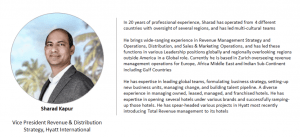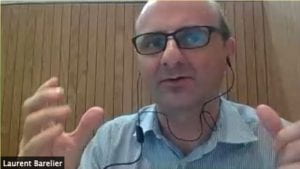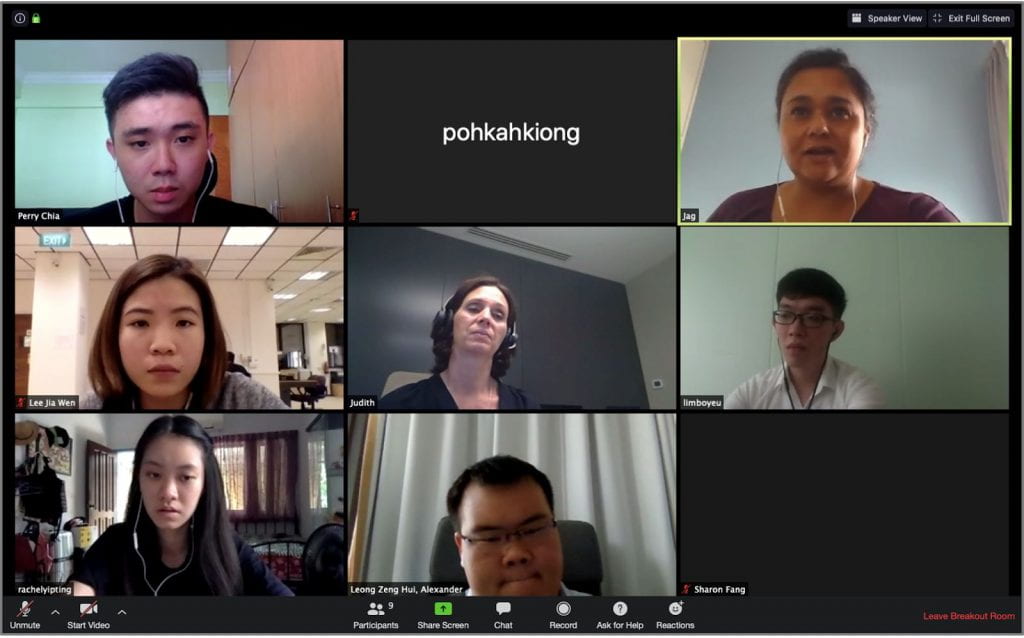Group 1
Preparing for the Post-COVID-19 World
Expert Participants: Dr Detlev Remy and Ms Ellen Li
Having been in the hotel revenue management scene for a long time, Dr. Remy shares with us that the COVID-19 pandemic reveals how hotels have learnt nothing from past epidemics and financial crises: they continue to panic and resort to cutting prices. Cutting prices is a poor strategy as it is always easier to slash prices in times of panic than to raise them during recovery, which would impede a hotel’s recovery post-crisis. Both Dr Remy and Ms Li concur that price-cutting will not be useful in attracting new patrons and will only cause a cannibalism of the hotel’s revenue from those already intending to travel. This strategy of price-cutting is especially costly for luxury hotels, as they also risk attracting the wrong crowd that may tarnish their reputation.
What hotels should be doing during this low-traffic season is to focus on optimizing their total revenue with the given demand i.e. squeezing as much as they can from those who have to travel out of necessity. Dr Remy also talks about how hotels can make use of this time to figure out a hotel’s DNA and what exactly they are offering to customers. With this strengthened foundation, they can build contingency plans for the next 3 to 5 months and restructure the group operations for a more efficient utilisation of resources. Most importantly, they can reinforce the value for existing customers in the hotels by enhancing their comforts.
Diving deeper into enhancing guest experience, Ms Li emphasises on the necessity of front-line employees maintaining a high level of customer service during these trying times. On top of that, hotels can also take this time to train their employees to be more flexible, creative, and capable of working cross-functionally. Staff termination should not be the top consideration as restaffing will be needed post-crisis, and it may be a difficult process. Additionally, for Ms Li’s hotels, they are also partnering with local communities to organize outings for their staff in a bid to boost staff morale during this trying period.
Other methods to tide through these periods of low demands is to ask companies to postpone events held at hotels, instead of cancelling. This helps boost a company through the recovery by securing demand. For Accor Hotels, as Mr Andrew Hodges shares with us in the first breakout session, they are also encouraging firms to book with them for corporate stays through enhanced incentives in the chain’s loyalty program.
Panic should not be spread and there should be more focus on the upsides because the pandemic will eventually end. Instead, hotels should use this period to evaluate operations and identify areas of improvement to better respond to future drops in occupancy. It is important for hotels to ensure they have the best strategies prepared for post-crisis recovery – such as secured demand (from postponed events); and to maintain customer service levels, prices and staff and to drive customer loyalty and demand.
______________________________________________________________
Group 2
Introduction
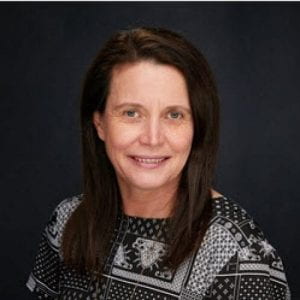
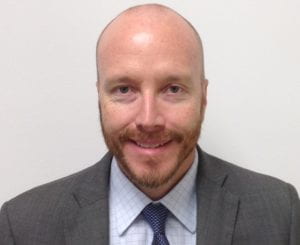
Ms Jackie Douglas Mr Fanie Swaenpoel
Our guest speakers were Mr Fanie Swaenpoel, Senior Vice President of Revenue Optimization at Marina Bay Sands and Ms Jackie Douglas, President of HSMAI Asia Pacific. Four main points were derived from the discussion about preparing their business for the post-virus world.
- On Ensuring Favourable Brand Image
Mr Swaenpoel explained that branding can be strengthened through three methods:
a. Having robust standard operating procedures in place for future emergencies
b. Being transparent and honest with their guests to build customer loyalty
c. Long-term preventive measures should be implemented and made known to the public
Swift and appropriate reactions by the affected company will lead to positive brand perceptions from customers in the short and long run.
- On Hotels Diversifying Source Markets
Ms Douglas shared that traditionally, most cruise customers come from Online Travel Agencies (OTAs) but through this crisis, they realized the importance of diversifying their customer base. Similarly, Mr Swaenpoel highlighted how difficult it was for hotels to diversify their business naturally. However, he believes that Marina Bay Sands Integrated Resort (MBS) and other hotels should make a conscious effort to diversify their source markets in the future and to not be “over reliant on just one source market”. For many, China was their “largest spender” that “Singapore, Australia, Europe all benefited from”, but having multiple customer markets is beneficial.
Another possibility is to promote the notion of “holiday at home”. Hotels in Australia have looked into local demand and staycations as a more stable source of revenue even after recovery from their bushfire crisis. Thus, other hotels can also utilize local demand to prepare for recovery.
- On having a good value proposition
Next, hotels can expand their range of services and emphasize on differentiation. Ms Douglas mentioned how hotels can provide other services like “spas, restaurants and food delivery”, and serve as spaces for “meetings and local events”. Similarly, Mr Swaenpoel raised how MBS leverages on their world class shows, F&B components and casino to diversify their revenue streams. He highlighted that focusing on having a good value proposition instead of steep discounting will ensure a good pickup in demand after the virus crisis, with no detraction in brand value. Rate obscuring practices such as giving shopping mall offers to patrons can protect brand value for recovery. Having superior value-adding services will ensure high demand after recovery.
- On Utilising Analytics for Recovery
Finally, analytics can help with regards to positioning of hotels. Businesses can analyse which regions and countries are more resilient with potentially faster recovery, thereby shedding light to potential consumer segments to target first. Thus, close monitoring of the situation can aid businesses in estimating and shortening their recovery timeline.
Conclusion
In conclusion, both speakers forecasted that the pandemic will possibly last 6 to 12 months, especially if it spreads to countries where healthcare is poor. To prepare for recovery, businesses should focus on having a good value proposition, diversifying their customer base and services and utilising analytics for recovery.
Image references:
https://hsmaiasia.org/team/fanie-swanepoel/
https://hsmaiasia.org/team/jackie-douglas/
(498 words)
Group 2: Daniel Lim, Tan Kang Ting, Alex Koh, Ruben Goh, Clarissa Ho
______________________________________________________________
Group 3
For our second break-out session, we had the pleasure of speaking with Rachel from IDeaS and Sharad from Hyatt regarding the various positional strategies companies can take coming out of the Covid-19 outbreak.
It became apparent to us from the get go that there’s much uncertainty surrounding the outbreak as Rachel and Sharad gave very different predictions on how long they anticipate the outbreak to last. Rachel gave 6 to 9 months while Sharad was more optimistic with 3 months as he was positive that governments are capable of containing the virus, and with it restore consumer confidence.
However, despite these differences, there was a general consensus on how hotels should position themselves post-outbreak.
Reach out to your high-value customers
Top priority for businesses are their customers, especially the high value ones. Reach out to the customers you know best at the right timing with customised offers to show them you know and care about them. Try to see how the hotel can extend courtesy and flexibility to them, so as to ensure that your customers return back.
Data analytics is key
“It comes down to good pricing analytics and algorithms. When the market rebound happens, it’s those that have good analytics and data that are better prepared for the swing.” – Rachel
When the rebound happens, it will be businesses with good analytics, algorithms and data that will be in the best position for they are more likely to see the micro swings earlier. To do this, businesses need to use practical data, both on the macro and micro level such as property transaction data, lead time, cancellation rate, etc. This will help them adapt to different scenarios and reach out to new sources of businesses.
However, companies need to isolate this period’s data, and look at data from similar time periods as trends observed now will likely be very different from those observed last year or next year. Companies also need to understand that there are limits to what softwares can do, so it is important for operators to play with their systems to get the best insights.
Have marketing plans ready to go
“Don’t reduce your marketing fund. Even though you don’t want to spend now, be prepared to go out with a bang.” – Sharad
Businesses need to have marketing plans and strategies ready for when the rebound occurs. Do not reduce marketing budgets, and make sure your sales team is motivated and have access to information on the ground. Now is the time to PLAN, companies need to prepare targeted marketing campaigns to attract different customers.
Don’t overly rely on any market
Diversified businesses tend to see more opportunities during times of uncertainty. Thus, It is important for businesses that are currently too reliant on one market (china, etc) to diversify its business and risk. With the closing off of the China market, hotels must be ready to penetrate new markets in other areas, and achieve a balance between brand position, profitability and hotel occupancy.
______________________________________________________________
Group 4
“In every risk, there is an opportunity” – Laurent Barelier, 2020
The highly contagious COVID-19 has taken the world by storm with many countries being overwhelmed by the sheer speed of contagion. Global transport and travel links have been hindered by countries either banning entry altogether or are on lockdown to restrict the spread of the virus. How will the hotel industry position for the post coronavirus world?
Hotel managers shared in a roundtable discussion with NUS revenue management students about the upsides and downsides of the COVID-19 virus. With the drastic drop in tourism demand globally, hotels are rethinking their fundamentals and are seeking to challenge the status quo. At the moment, hotels in the Asia Pacific regions have been hit the hardest due to the decrease in Chinese tourists, who are major contributors to hotel occupancies. This is vastly different from the SARS situation 17 years ago. Hotels are now turning to diversified sources of demand such as looking into staycation or domestic travel options as a possible bulwark from future disasters.
Client Profiling
Data savvy managers are analyzing client profiles to determine the best packages to offer at this time. They are reviewing transit lines to identify other niches or untapped markets that have yet to be explored for the aim of diversifying the type of clients. Each hotel can be viewed as a complex microcosm of the world. Collating personalized client profiles from online platforms such as Expedia gives managers greater insights into the demands of their clients. When the pandemic ends, hotels will be armed with the knowledge and tools to provide personalized services for their clients. Furthermore, managers are working on client-facing essentials such as updating social media pages and websites to entice customers.
Protecting Brand Image
Both Laurent and Kamesh agreed that cutting rates should be the last resort. Rate cuts have been shown to attract the wrong crowds of customers, which would tarnish the brand reputation, especially for high-end hotels. Hence, managers should maintain room rates in anticipation of demand recovery when the crisis passes. Aggressively lowering rates may increase the occupancy rate in the short-term but will cause RevPAR to fall. Ultimately, protecting the brand image for a post coronavirus world ensures long-term profitability.
Training and Renovation
Managers are sending their employees to participate in training courses to improve their customer service skills. Employees are cross-trained to ensure that they are able to tackle future demand surges. They can also brush up on soft skills such as communication and leadership. According to Dr. Detlev, there is a surge in demand for training in crisis management as most companies are ill-equipped to deal with such situations. Additionally, hotels can conduct renovations and equipment replacement work that normally would have disrupted client flow in this period.
In conclusion, we should focus on improving ourselves to prepare for the post coronavirus world.
“Stay optimistic & we will get through this”- Philip Niemann, 2020
______________________________________________________________
Group 5


Tarandeep Singh Joey Kang
During the roundtable discussion, our team spoke to two industry leaders: (1) Tarandeep Singh, Senior Director Revenue Management of InterContinental Hotels Group (IHG), and; (2) Joey Kang, Senior Director of APAC Enterprise Business Development in The Rainmaker Group. We discussed ways businesses can prepare themselves for a post-coronavirus future and strategies hotels can adjust to win in the times of COVID-19.
Preparing for a post-coronavirus future
Invest in your employees
Tarandeep shared that IHG would be investing and nurturing new talents during this low-demand period. This is to ensure that IHG will be ready for the eventual rebound in demand where occupancy is expected to exceed historical benchmarks.
“COVID-19 serves as the perfect time to invest in our people and talent. Not long ago, a workshop was conducted to retrain our employees. This enables talents to stay on top of the game and be ready for a post-coronavirus world.”
— Tarandeep Singh
Invest in robust revenue management systems
Despite temptations to cut costs, Tarandeep advised against pulling back on investing in guest reservation systems. While technology is crucial in revenue management decisions, systems may suggest solutions that are not ideal for the current low demand circumstances. For instance, IHG’s revenue management system recommended price reductions after monitoring competitors’ room rates. However, this would lower profitability, resulting in employees’ payroll cuts.
As such, Joey shared the need to reconfigure systems, allowing managers to flag the extreme low demand due to COVID-19 outbreak as an ‘uncommon’ event where typical revenue management recommendations do not apply. This also ensures that the data collected during this period does not impact future demand forecasts. She further highlighted other solutions that RMS companies are offering in order to aid the businesses in planning for similar events in the future.
“RMS has to configure this COVID-19 period as an outlier where low demand is encountered over a long period. Besides suggesting solutions to hotels, RMS companies are also assisting companies in tracking the impact of the outbreak on its businesses through the collection of no-shows and cancellation data for better future forecasting.”
— Joey Kang
Dealing with COVID-19
Say NO to Price Reduction
During the discussion on price reductions, both leaders agreed that slashing room prices to encourage more bookings is unsustainable in the long run. Managers may decide to drop rates in order to improve top-line performance (measured using indicators such as REVPAR); but this approach neglects the impact on companies’ bottom lines. Following competitors’ price cuts is unnecessary as the real problem still lies with low demand.
Reinvent your marketing strategies
Instead, both Tarandeep and Joey proposed readjusting companies’ marketing strategies. Hotels may consider different ways to appeal to local markets, and turning hotels towards staycations is one possible option to make up for the dive in tourist occupancy levels as a result of the ongoing Covid-19 outbreak. Companies should thus redevelop their marketing campaigns to target the most profitable customer segments, thereby more effectively utilising their marketing dollars.
______________________________________________________________


